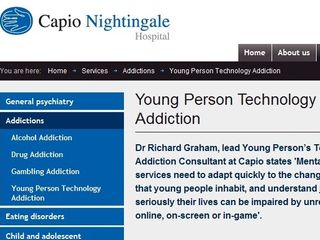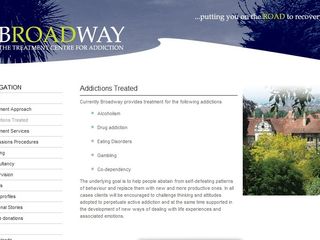Are you addicted to your iPhone and is it screwing up your life?
Gaming and mobile addiction explained by the experts
It's not just hardware though. A new specialist treatment centre to offer private therapy to patients suffering from addiction to videogames opened its doors in London this month, highlighting the growing (and highly controversial) issue of teenagers and young people becoming problematically dependent on gaming and other technology at the expense of their real lives beyond the screen.
Capio Nightingale Hospital is described as central London's only independent mental health hospital, and is launching a dedicated Young Person Technology Addiction Service, following a recent survey that claimed 63 per cent of 11-18 year olds felt addicted to the internet and many spending up to 10 hours a day using computer and videogames.

GAMING ADDICTION: Capio Nightingale offers new treatment centre for problem gamers
"For young people who are developing so quickly both neurologically and physically, the risks [of internet addiction] are magnified with an increase in agitation, hyper-arousal, an inability to concentrate and, ultimately, depression," reads the press release issued to announce the opening of the new London facility.
The centre has coined the phrase 'screenagers' and has developed what it calls a "tri-partite programme which can be tailored to meet the patient's needs" ranging from intensive in-patient care to day care, group and individual therapy "to increase off-screen social activities and to develop strategies to cope with online problems, in particular issues around cyber bullying."
"Mental health services need to adapt quickly to the changing worlds that young people inhabit, and understand just how seriously their lives can be impaired by unregulated time online, on-screen or in-game," says Dr. Richard Graham, Lead Young Person's Technology Addiction Consultant at Capio Nightingale Hospital.
"We have found that many of the existing services fail to recognise the complexity of these situations, borrowing from older models of addiction and substance misuse to very limited effect."
Get daily insight, inspiration and deals in your inbox
Get the hottest deals available in your inbox plus news, reviews, opinion, analysis and more from the TechRadar team.
Capio is not the first British treatment centre for gaming addiction, however. Broadway Lodge in Weston-Super-Mare was the first clinic in the UK to treat clients specifically suffering from addiction to videogames and online gaming. TechRadar spoke with Peter Smith, a counsellor who specialising in treatment for gaming addiction at the facility, to find out more about the work they do.

BROADWAY LODGE: The UK's first gaming addiction specialists
While gamers and the games industry generally scoff at the very idea that the games they love to play and create could be harmful to a minority of users, Smith tells stories of family members "with really quite sad stories of young people who have been lost to them because of gaming… young people who had a lot of potential to do very well."
He tells the story of one particular patient who was a Cambridge graduate and a PhD student in microbiology, who, after finishing his studies, "just drifted home and was at home spending all of his time playing games… his mother was utterly distraught and so she contacted us."
"We also had a lady from Spain recently, who emailed to say she and her family were desperate for some help for her son, who would spend all day and well into the early hours of the morning playing games non-stop."
Smith notes that there are multiple problems that result from such addictive behaviours, including health issues ("there was one instance of a chap becoming anorexic as a result of not eating, which became secondary to playing the game"), relationship difficulties and, in worst cases, complete family breakdowns.
"So they don't eat round a table together, and it is not unusual for a mother to take food up to their child's room so they can continue gaming. There is also strong resistance by the gamer to go to family gatherings – weddings, birthdays, funerals and the like."
However, Smith is in no way in denial about the positive pleasures that games can give to teens and young people, in addition to the opportunities to make online friends when playing MMOs such as World Of Warcraft.
"Many, many people play games and get a lot of pleasure out of it. We don't want to demonise it. Games gave them an opportunity to succeed and feel confident and communicate in a language that gives them a kudos that normal socialising wouldn't," he says, though in a small minority of cases there is the possibility "that this can become a downward spiral..if someone has a bit of self-consciousness then games can fill or replace that gap."
"But because you are playing more games then you don't get the opportunity to improve that in real life, to the point where it becomes quite difficult for you to feel confident about meeting people face to face."
Recovery strategies
Capio Nightingale Hospital asks problem gamers and potential tech addicts an initial 10 questions to help identify technology addiction, while Northampton University's Professor Nada Kakabadse thinks that ICT addiction has, to date, been treated by policy makers as "a kind of elephant in the room – everyone sees it but nobody wants to acknowledge it.
"If society is truly concerned with quality of life, then the need for serious discussion concerning the impact of ICT on employee work practises and work-life balance is now critical," she argues, stressing that there is an urgent need for new laws and regulatory policies to deal with the consequences of techno-addiction.
Kakabadse warns that, should the courts not recognise addiction to work-related technology as a compensable form of employer or manufacturer neglicence, they soon, issuing the stark warning to companies that: "The only guarantee is that ICT addiction and techno-stress are on the increase. It's best to deal with them before they deal with you."
And as for personal use of your iPhone or your 'CrackBerry', she adds: "Just think before you click! Before you send that next batch of emails or rush to connect with all those others [online]. Is this volume necessary? Could you connect in a more socially uplifting way?"
Current page: Addiction clinics open in the UK
Prev Page Does new technology improve your life?Most Popular


